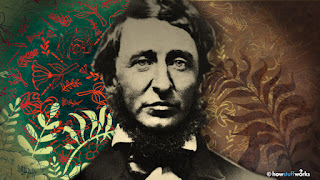Henry David Thoreau :
Henry David Thoreau (1817–1862) was an American writer, philosopher, and naturalist associated with the transcendentalist movement. Thoreau strongly opposed materialistic values and emphasized the importance of personal freedom, self-sufficiency, and environmental stewardship. His ideas significantly influenced literature, political activism, and ecological consciousness, leaving a lasting legacy in these fields.
Self-Reliance : Thoreau believed in living independently and relying on one’s own abilities. In Walden, he left society to live in the woods, showing that a simple life without dependence on material wealth leads to true fulfillment.
Free Thinking/Individualism : He encouraged people to think for themselves rather than follow societal norms. His writings emphasize the importance of personal beliefs and inner wisdom over external influences.
Nonconformity/Civil Disobedience : Thoreau resisted unjust laws and refused to conform to government policies he disagreed with. In Civil Disobedience, he argued that individuals should peacefully resist injustice, inspiring future leaders like Gandhi and Martin Luther King Jr.
Spirituality : He saw spirituality as a personal experience connected to nature rather than formal religious practices. His reflections in Walden suggest that understanding oneself and nature leads to a deeper spiritual awareness.
Importance of Nature : Nature played a central role in Thoreau’s philosophy. He viewed it as a source of wisdom, peace, and personal growth, believing that by immersing in nature, people could understand life’s deeper meanings.
Confidence : Thoreau urged people to trust themselves and follow their own paths, even if society disagrees. His life at Walden Pond and his essays reflect his belief that confidence in one’s convictions leads to a meaningful and purposeful life.
Conclusion :
Thoreau’s writings embody the core principles of Transcendentalism, promoting independence, critical thinking, and a profound bond with nature. His focus on staying true to one’s values, challenging oppressive systems, and seeking spiritual growth remains influential in social and environmental activism. In Walden and Civil Disobedience, he not only expressed these ideals but also practiced them, solidifying his legacy as a foundational figure in American Transcendentalist thought.
Margaret Fuller :
Question : Share your thoughts about Thoreau's statement: "that government is best which governs least".
Which philosophy is more relevant today?
In today's world, Transcendentalism might feel more relevant. Its focus on individual freedom, personal growth, and a deep connection to nature resonates with modern ideas about self-expression, environmentalism, and personal well-being. In a time when many seek personal fulfillment and question traditional institutions, Transcendentalist ideas about trusting your instincts and finding truth within yourself can provide guidance.
Puritanism, with its rigid rules and focus on obedience, may feel less relevant today, as society increasingly values personal freedom and diversity of thought.
References :
The Editors of Encyclopaedia Britannica. "Henry David Thoreau". Encyclopedia Britannica, 31 Jan. 2025, https://www.britannica.com/biography/Henry-David-Thoreau. Accessed 1 March 2025.
CEC. “Margaret Fuller : Nineteenth-Century Feminist Thought.” YouTube, 1 Nov. 2021, www.youtube.com/watch?v=61qNcvHj1mo.

.jfif)








.jfif)
No comments:
Post a Comment